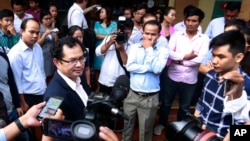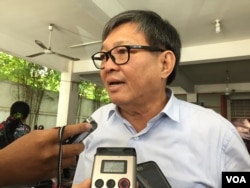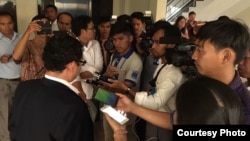All but a handful of foreign journalists on staff at The Phnom Penh Post, Cambodia’s last remaining independent daily newspaper, resigned on Wednesday. Citing differences over the meaning of “editorial independence,” they quit within days after new owners fired its editor-in-chief who refused to remove a published article from the website linking the new owner of the paper to Prime Minister Hun Sen.
The resignations mean only a few foreign journalists in the newsroom when the paper was sold remain with the Post. The English-language newspaper, which had employed Cambodian and foreign journalists since its founding in 1992, was known for a feisty voice often critical of the government and well-connected economic interests.
The journalists’ move came after the sale of the Post by Australian mining businessman Bill Clough to Malaysian public relations executive Sivakumar S. Ganapathy.
Sivakumar’s public relations firm lists Hun Sen as a client. Sivakumar has not responded to requests for comment from Voice of America, which has tried to reach him since the sale of the Post was announced Sunday. Sivakumar issued a statement dated May 6 refuting links to Hun Sen, calling the reporting “totally untrue and cannot be concluded based on what took place between the PR firm and the client more than 25 years ago.”
Fears of crackdown
The journalists resigned after staging a walkout and meeting with representatives of the new owner.
“I doubt the Post will continue to be the fearlessly independent press it has been for 26 years,” Erin Handley, a former Post reporter told the VOA Khmer Service in an email exchange. “My resignation is a decision I did not take lightly, but on an emotional level it feels like I am betraying my Khmer colleagues, who I am so incredibly proud of.”
The sale of the Post and the subsequent upheaval comes amid concerns over the government’s crackdown on the press and critics in the run up to a general election set for July 29. Hun Sen and his party are expected to win, having dissolved the main opposition party in November.
The Post had come under pressure in recent months following the closure of its rival English-language daily, The Cambodia Daily, which was hit with a hefty tax bill. The Post was also handed a tax bill to the tune of $3.9 million, which was settled ahead of the sale, according to a statement from Clough.
Son Chhay, a former MP with the now-dissolved opposition Cambodia National Rescue Party, said that the closure of the Daily and the sale of the Post, coupled with the quieting of numerous radio stations that broadcast critical coverage of the Hun Sen regime, had stifled debate ahead of the July general election.
“If The Phnom Penh Post, which we always thought of as a newspaper offering publication without fear or favor, was sold to serve political interests, I think it’s a big regret and it will cause criticism of the media landscape in Cambodia,” he said.
Press freedom, timing of sale
In its 2018 World Press Freedom Index, Reporters Without Borders (RSF) recorded the crackdown on media freedom in Cambodia, which fell 10 places and is now ranked 142 out of 180 countries.
“From the outside looking in, the most troubling thing is the timing of the tax bill’s settlement and the Post’s subsequent sale. The odds of them not being connected seem incredibly remote,” the paper’s former editor-in-chief, Chad Williams, told Reuters Sunday.
“That’s troubling because it suggests the Cambodian government may have used the threat of a shutdown to essentially coerce the sale,” Williams said.
Sok Eysan, spokesman for the ruling Cambodian People’s Party (CPP), rejected the allegations of government influence in the sale.
“It’s a selling and buying. They made a bilateral contact. The government didn’t interfere with this,” he said.
'My trade is journalism'
Kay Kimsong, the editor-in-chief of the English and Khmer-language editions, was fired Monday after representatives of the new owner ordered senior staff to remove the article on the paper’s sale from its website.
He refused.
Five senior staff members resigned in protest that day, as did CEO Marcus Holmes. More than 20 staff members signed a statement that expressed “disgust” at Kimsong’s dismissal, and many staffers walked out.
A lawyer for Sivakumar, identified by the Post on Tuesday as Ly Tayseng, a Cambodian, said the new editor-in-chief, identified as Joshua Purushotman, would vet articles in future editions. According to LinkedIn, Purushotman spent a decade working in PR.
The Post reported Tayseng said that the article on the sale was ordered removed because it “damaged our reputation” and declined to discuss the alleged inaccuracies in detail.
“According to the new owner, he thinks that I have made a huge mistake,” Kimsong said. “They think the article should not have been published.”
“My trade is journalism and I don’t know what else to do,” he told VOA Khmer. “There are two options — one is that if I can’t go back to newspapers, I will just sell fried noodles.”
Loss of independence
In a staff meeting, Tayseng and Purushotman said Kimsong’s firing was a money-saving business move as the new owners had hired a new top editor, and only wanted to pay one, according to the Post’s own story.
Chhay Channyda, chief of staff at the Post, said she was concerned by the possible loss of independence under the new management.
“This is what we worry about because on the first day when there is a new boss or new company, they came to ask us to remove an article that we wrote,” she said.
Yon Sineat, a reporter, said she saw the takeover as a “serious threat to press freedom.”
“We are concerned that we will not be able to fully practice our journalism or write to reflect the truth,” she said.
Tipping point
For many of the foreign journalists, the tipping point was when “the article, which outlined our new publisher’s company’s previous business and government connections, was taken down, and despite our protests, it didn’t seem like it would go back up,” Handley, the former Post reporter told the VOA. “That appeared to be a breach of our editorial independence and … (it) became increasingly clear that the editorial staff and the new management had irreconcilable ideas about what editorial independence’ entails.”
Handley told VOA that while “I can’t speak for my Khmer colleagues, only my own impressions, but I think there was despair and hopelessness in the newsroom, and perhaps a sense of resignation or inevitability.”
Handley said the foreign and Cambodian journalists supported each other.
“There are few stories non-Cambodians could report solo — we rely on them and they are key,” she wrote. “So I don’t pretend arrogance — the loss of non-Cambodian staff sends a message, but it is important to bear in mind that non-Cambodian reporters can afford to be a lot more cavalier. However, the resignation of all foreign news staff sends the message that there are consequences for trying to undermine the intelligent, in depth and independent ethos of our masthead.”
In the run-up to the July 29 national elections, Cambodia’s independent press is “in ruins,” according to Reporters Without Borders.
The 24-year-old Cambodia Daily published its last edition September 4 with the headline “Descent into Outright Dictatorship.” Days later, Radio Free Asia, which like the Voice of America is based in Washington and operates under the auspices of the U.S. Broadcasting Board of Governors, closed its Phnom Penh news bureau because of similar pressure over a tax bill.
Two former RFA reporters, Uon Chhin and Yeang Sothearin, were charged with espionage in another case in November. They were denied bail recently.
Aun Pheap, a veteran Cambodian journalist, has been granted refugee status by the United Nations’ refugee agency and has fled to the United States, fearing arrest on charges related to reporting before the June 2017 local elections.
Additional reporting by Say Mony in Washington.









